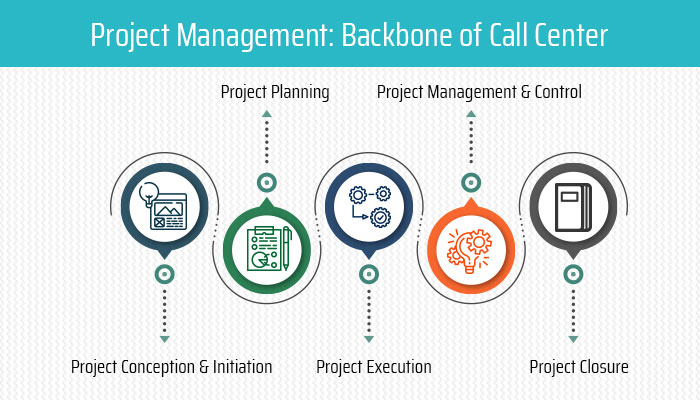Project management is the backbone of businesses. Managers are responsible for more than just managing people. To add to the need for managing regular business operations, there are often separate projects that require special attention, such as starting a new marketing project for a call center.
But what is project management? In a general sense, it refers to the organizing and managing tasks from start to finish for a particular venture. The project manager is responsible for mapping out the process it will take to bring the project to completion, detailing the necessary resources, sourcing who and what is needed, and ensuring all goes according to plan.
Though this is the general idea of how call center project management works, keep in mind that every case is different. Here are the five phases that professionals can tweak to fit the individual needs of their various projects.
Project Initiation
This is the make it or break it phase of a project, where project managers must put the original concept to the test. Here, project managers measure both the purpose and potential benefits of the call center project. This requires the use of two primary tools for evaluation, namely a feasibility study and a business case document.
The business case document takes a close look at the purpose behind the proposal and attempts to prove why it is needed. The feasibility tool is used to determine whether or not the company has the resources at hand to support the project and ensure it meets the goals. Projects that do not pass these two tests should be discarded.
Project Planning
If management decides that the proposed project is profitable and feasible, then the planning phase begins. At this point, project managers take stock of all the moving parts and construct a plan for execution. Even the best-proposed ideas will fail without a solid plan, so this is an important aspect of project management.
Below are some aspects of a project that must be taken into consideration:
Overlapping tasks
Tasks that are dependent on the completion of other tasks
The order in which particular tasks must be completed
The time estimates for each task
Additionally, the project manager must include plans for securing the necessary resources and an estimated time for project delivery.
Project Execution
Here, the project plan is put to the test as team members begin to carry out what is outlined. Depending on the size of the project, there may be project leaders who are responsible for managing smaller groups. This helps to reduce the need for the manager to handle every detail of the project.
Instead, the project manager will be focused on the following phase of this project. It is well to note that the success of this phase relies heavily on regular and clear communication among everyone working on the project. This ensures a smooth transition from one milestone to the next.
Project Management and Control
It now becomes the role of the project manager to ensure there is little to no deviation from the original plan. This helps to ensure the project is completed on time and within the budget. However, – obstacles often arise that were not originally accounted for, which may result in the project manager returning to phase two several times. Some obstacles may also be outside the project manager’s control, such as natural disasters or the CEO pulling funding at the last minute.
Project Closure
If activities progressed according to plan, the project should have been completed on time. However, contrary to popular belief, the actual completion of the project does not mark the end of the project management cycle; there is still more work to be done. Good project managers collect information in this final phase to see how to better approach the next project.
Surveys may be used to ask about communication, clarity of goals, and other key aspects. The project manager will also consider how well the project stayed within time and monetary budget constraints. Following this, a full report is issued to the interested parties.
Project management is not just the key to maintaining the status quo, but the source of innovation. When applied effectively, it can also help to increase company efficiency by shortening some of the product cycles and processes that tack on the additional cost in time and money to key business operations. In fact, Forbes notes that without proper management, companies waste roughly 10% of output. Are you interested in learning how call center project management may benefit your business? Reach out to Etech today.
